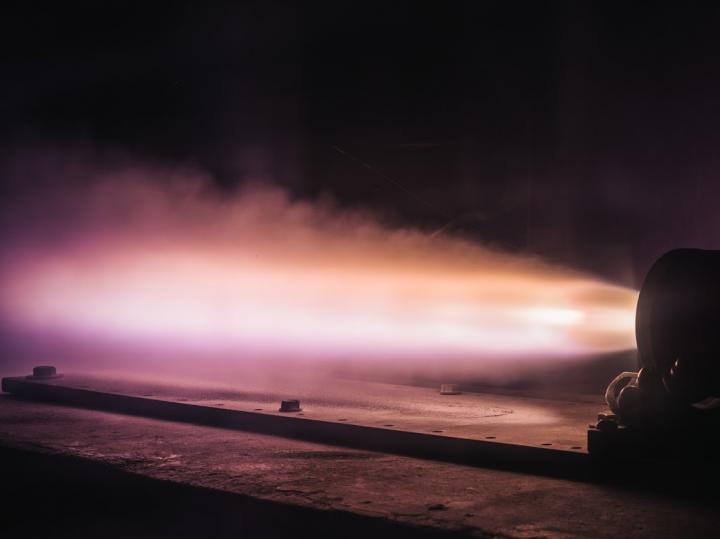Inaugural competition recognizes Adranos’s high-performance rocket fuel as a disruptive innovation in the future battlefield

Credit: (Image provided)
WEST LAFAYETTE, Ind. – Adranos Inc., a Purdue University-affiliated company developing a high-performance, solid propellant for long-range missile and space launch systems, has won the Army’s inaugural xTechSearch competition, besting more than 350 companies in the months long competition.
The award decision was made by senior Army leaders based on what technology they believed could have the biggest impact on the Army’s modernization needs. Adranos previously was awarded $125,000 for being selected a finalist in the competition, which it used to perform a live flight demonstration of its novel rocket propellant called ALITEC. A video of the flight demonstration is available here.
Adranos founders Brandon Terry, who received his doctorate in aeronautics and astronautics from Purdue, and Chris Stoker, an Indiana University JD/MBA alumnus, will use the $200,000 award funding to enable company growth and continued ALITEC development. The technology is a high-performance solid rocket propellant that has more thrust and is less corrosive than traditional solid propellants.
“Brandon and I have always believed in our technology, but to have senior Army leaders recognize ALITEC’s potential impact is a great honor for us. We are highly motivated to take the funding from this competition and advance our rocket fuel to the next level,” Stoker said. “In this year when Purdue is celebrating its 150th anniversary and the 50th anniversary of Purdue alumnus Neil Armstrong landing on the moon, we’re excited to be working on another potentially giant leap when it comes to aeronautics.”
Adranos’s flight demonstrations confirmed that ALITEC could substantially increase the range of ballistic missiles over traditional solid propellants. The technology aligned with the Army’s Long Range Precision Fire modernization priority, which is focused on restoring the U.S. Army’s dominance in range, munitions, and target acquisition.
ALITEC is processed in the same way traditional propellants, meaning that it can be used in any of the current or future missile platforms employed by the Department of Defense.
“We mix it the same way. We cast it the same way. We cure it the same way. The only difference is we’re replacing one metal powder with another metal powder in the processing,” Terry said.
The propellant could be used by the Army, Navy, Air Force, NASA and other Department of Defense agencies, as well as U.S.-allied nations.
The Expeditionary Technology Search, shortened to xTechSearch, called on companies to demonstrate technologies that can help the Army meet its modernization challenges. The goal is to seek nontraditional innovators who can work with the Army, including through cooperative research opportunities with Army scientists, as it modernizes the force.
From robotics and night-vision to radar, machine guns and duct tape, innovation has driven the very nature of how the Army fights, said Jeffrey White, principal deputy assistant secretary of the Army for acquisition, logistics and technology.
“Innovation reforms, both large and small, have improved the lives of our soldiers,” White said. “And continued innovation is absolutely critical for force modernization.”
Adranos, which is named after the Greek god of fire, has previously received nearly $1 million of funding for ALITEC development. Stoker said $600,000 in funding came from Archibald Cox Jr., chairman of Sextant Group Inc., a private investment firm. Cox is the former chairman of Barclays of America and former CEO of Morgan Stanley International and various other companies. He is now on the Adranos Board of Directors. The remaining funds came from other state and federal programs.
The company received startup assistance from the Purdue Foundry, an entrepreneurial accelerator in the Burton D. Morgan Center for Entrepreneurship.
“We’ve worked with nearly 250 startups, and Chris and Brandon are ‘rocket’ stars with their expertise in the technology and in the development of their entrepreneurial skills,” said Greg Deason, senior vice president of entrepreneurship and place making. “Even more importantly, their innovation will serve the U.S. Army in advancing defense technologies. Very proud of these guys.”
Adranos’ work aligns with Purdue’s Giant Leaps celebration, celebrating the university’s global advancements in space exploration as part of Purdue’s 150th anniversary. This is one of the four themes of the yearlong celebration’s Ideas Festival, designed to showcase Purdue as an intellectual center solving real-world issues.
Adranos emerged as a startup from what is now called the Purdue Energetics Research Center. Technology used by Adranos is licensed through the Purdue Office of Technology Commercialization, which patented the technology. Adranos is continuing to raise funds to advance the technology.
###
About Purdue Office of Technology Commercialization
The Purdue Office of Technology Commercialization operates one of the most comprehensive technology transfer programs among leading research universities in the U.S. Services provided by this office support the economic development initiatives of Purdue University and benefit the university’s academic activities. The office is managed by the Purdue Research Foundation, which received the 2016 Innovation and Economic Prosperity Universities Award for Innovation from the Association of Public and Land-grant Universities. For more information about funding and investment opportunities in startups based on a Purdue innovation, contact the Purdue Foundry at [email protected]. For more information on licensing a Purdue innovation, contact the Office of Technology Commercialization at [email protected].
Media Contact
Tom Coyne
[email protected]
Original Source
https:/




